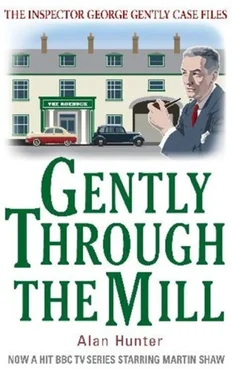Alan Hunter - Gently through the Mill
Здесь есть возможность читать онлайн «Alan Hunter - Gently through the Mill» весь текст электронной книги совершенно бесплатно (целиком полную версию без сокращений). В некоторых случаях можно слушать аудио, скачать через торрент в формате fb2 и присутствует краткое содержание. Жанр: Классический детектив, на английском языке. Описание произведения, (предисловие) а так же отзывы посетителей доступны на портале библиотеки ЛибКат.
- Название:Gently through the Mill
- Автор:
- Жанр:
- Год:неизвестен
- ISBN:нет данных
- Рейтинг книги:3 / 5. Голосов: 1
-
Избранное:Добавить в избранное
- Отзывы:
-
Ваша оценка:
- 60
- 1
- 2
- 3
- 4
- 5
Gently through the Mill: краткое содержание, описание и аннотация
Предлагаем к чтению аннотацию, описание, краткое содержание или предисловие (зависит от того, что написал сам автор книги «Gently through the Mill»). Если вы не нашли необходимую информацию о книге — напишите в комментариях, мы постараемся отыскать её.
Gently through the Mill — читать онлайн бесплатно полную книгу (весь текст) целиком
Ниже представлен текст книги, разбитый по страницам. Система сохранения места последней прочитанной страницы, позволяет с удобством читать онлайн бесплатно книгу «Gently through the Mill», без необходимости каждый раз заново искать на чём Вы остановились. Поставьте закладку, и сможете в любой момент перейти на страницу, на которой закончили чтение.
Интервал:
Закладка:
‘Who is this man?’
Mercilessly Gently stood over him.
‘He’s a bloody murderer-!’
‘But what’s his proper name?’
Roscoe dragged himself upright. The intervention had come none too soon. Not only was blood rippling down from head wounds but it was soaking through his jacket from gashes on his arms.
‘You got to help me-’
‘Who is this man?’
‘Get me to a sodding doctor!’
‘Just as soon as you answer my question.’
Dashing the blood from his eyes, Roscoe stood wavering for a second. Dutt thought he’d never seen a more ghastly-looking figure. Then the bookmaker spat with all his remaining strength, spat at Pershore, spat at the policemen.
‘He’s Palmer if you want to know… the joker what took the City and Western Bank!’
And before Gently could catch him he collapsed on the bloodied grass.
CHAPTER SIXTEEN
So, in effect, it was only the beginning of a case: a case which sent the Fraud Squad delving back twenty-five years. By the time they had finished their reports covered several hundred typewritten sheets, with no prospect whatever of a conviction at the end of it.
But a portrait emerged from their onerous labour, a portrait somehow pathetic as well as sinister. George William Palmer, alias Geoffrey Wallace Pershore, seemed a character belonging to another era.
He was the son of a chauffeur in a small town in Somerset, they had elicited that through Somerset House. By an odd coincidence he had been born on 18th February, 1902; the coincidence being that on that day Thomas Peterson Goudie, whose practices on the Bank of Liverpool might have furnished Palmer with a blueprint, was brought to trial in the Central Criminal Court.
His mother died when he was five. His father — could this have been quite irrelevant? — was in the employ of a rich glove-manufacturer who was a leading citizen and had been mayor of the town in 1909. When Palmer was ten his father was sacked, apparently unjustly, though the chauffeur had immediately got another situation with the widow of a coal-merchant. With her assistance, Palmer was sent to the local grammar school, and by her good graces he was received into the employ of the City and Western Bank at Bristol when his schooldays were ended.
There, for ten years, he was a model employee.
‘He was punctual and efficient’ — so ran a statement — ‘and thoroughly reliable in all his duties. He had a somewhat negative character and appeared to be rather lonely. He seemed to lack initiative and personal ambition.’
Are bank managers among the world’s keenest observers?
‘Blimey, I knew Palmer!’ — this was from another source. ‘Always saw him at Bath and the meetings round that way. Quiet sort of a cove, though he dressed up to the nines. Many’s the fiver I’ve took off him on a sure thing what come unstuck.’
And from a respectable publican’s wife with five grown-up children: ‘He was always such a toff… that was before I met Albert, mind you!’
So there had been two sides to Palmer in those distant days. There was the official face, so to speak, and the racecourse dandy. And like Goudie before him, he found that one did not adequately support the other, and like Goudie again, it occurred to him that certain loopholes existed…
‘The earliest discrepancy occurs on 23rd May, 1930. A cheque debited to Henry Askew, of the Bristol shipowning company, is shown as cleared in the A-D clearance book. The journal is ticked to indicate that the account was posted, but in fact it was never entered in the ledger nor the cheque filed.’
It was Goudie all over again, using the tried and trusted method. Askew, the shipping magnate, had taken the place of Hudson, the soap millionaire. At the weekly audit a Mr Brownlow was shown to be a hundred pounds below his real wealth, but the matter was generously readjusted on the next day after…
‘For nine months there is no record of further discrepancies.’
This was where Goudie and Palmer parted company. Racing dominated the Scot and drove him from indiscretion to indiscretion, but Palmer, once out of his jam, took care never to get into another one. Quite other ideas had been occurring to the chauffeur’s son… from now on, he was going to be nobody’s mug!
‘On 15th March, 1931 a cheque drawn for two thousand pounds in favour of a “D. S. Lane” is shown as cleared and posted, but was not entered in the ledger or filed.’
How that same D. S. Lane was going to bedevil the Fraud Squad investigators through acres of dusty bank-sheets!
‘On 30th March a similar sum, and thereafter until the end of the financial year in April 1932…’
Palmer’s procedure was simple. It followed the classic line at all points. His current account with the bank supplied him with their cheques, and as the A-D ledger clerk he was painfully familiar with Askew’s signature. Then, when the forged cheques came back, they disappeared conveniently down the staff WC…
‘By 10th June, 1934 there was a deficit of exactly two hundred and fifty thousand pounds.’
The danger was, as with Goudie, that some accident might involve the journal and the ledger being compared; but once more fortune seemed to be favouring the bold. As for the audits, they could be got round, though the procedure was growing increasingly complex.
‘From that date until his resignation took effect in August Palmer seems to have ceased his operations.’
Always a tidy man, he had wound up his scheme on arriving at a round figure.
‘The interval appears to have been spent in the manipulations of his assets, which were dispersed in a number of accounts at various banks. These we believe to have been redeposited, probably in London, but a very full enquiry has failed to elicit…’
Palmer, in fact, had successfully covered his tracks, and it remained for him gracefully to disappear from Bristol. His resignation was accepted. He was given excellent references. On 17th August, 1934 he departed on the London express, having just, and for the last time, carried his accounts through the weekly audit.
Six days later the storm broke.
And Palmer, with a quarter of a million pounds, had vanished into the blue.
At that time a sergeant and only recently attached to the Yard, Gently could remember the excitement and clamour of those humid August days. A friend of his, Tebbut, belonged to the Fraud Squad, and he recalled the young man’s enthusiasm slowly evaporating into depression — coupled, perhaps, with some grudging admiration for Palmer’s magnificent effrontery. At first they were going to get him inside the week — nobody got away with that sort of thing! Then, possibly, it would take a little longer, since by that time it was obvious that chummy had got abroad…
And now, finally, twenty-odd years after, it was Gently who was going to fill up the picture… the picture of a Palmer suffering a sea-change in Africa, and turning up, as Pershore, to become a leading citizen in another small town.
Had he really been surprised, once, that Pershore drove the Bentley himself?
‘I suppose he felt at home here.’
Superintendent Press wanted to talk endlessly about the case. He kept ordering cups of coffee and having to make journeys down the corridor. Each time he came back quickly, as though fearing that Gently would have taken the opportunity to escape.
‘Do you know the place he came from? Is it anything like Lynton?’
Oddly enough, it wasn’t, except…
‘There’s a similar sort of atmosphere. You get it in all places of about the same size.’
‘Ah, that accounts for it!’
‘That, and the fact that Lynton is the width of England away from Bristol, and rather cut off.’
Читать дальшеИнтервал:
Закладка:
Похожие книги на «Gently through the Mill»
Представляем Вашему вниманию похожие книги на «Gently through the Mill» списком для выбора. Мы отобрали схожую по названию и смыслу литературу в надежде предоставить читателям больше вариантов отыскать новые, интересные, ещё непрочитанные произведения.
Обсуждение, отзывы о книге «Gently through the Mill» и просто собственные мнения читателей. Оставьте ваши комментарии, напишите, что Вы думаете о произведении, его смысле или главных героях. Укажите что конкретно понравилось, а что нет, и почему Вы так считаете.












